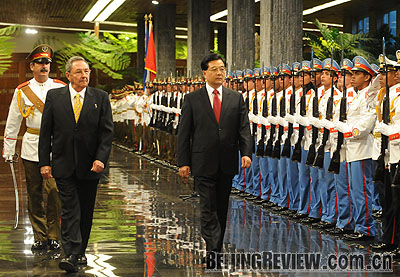|
 CLOSER FRIENDSHIP: Chinese President Hu Jintao inspects the honor guard together with Cuban President Raul Castro during a welcome ceremony in Havana on November 18
CLOSER FRIENDSHIP: Chinese President Hu Jintao inspects the honor guard together with Cuban President Raul Castro during a welcome ceremony in Havana on November 18
President Hu Jintao arrived in Cuba on November 17 for a state visit, his second in four years. Two weeks earlier, the Chinese Foreign Ministry had issued China's policy paper on Latin America and the Caribbean, reflecting China's special attention to its relationships with Latin American countries.
Cuba was an important stop on Hu's Latin American tour, which showed how much the Chinese Government cherishes the Sino-Cuban ties. Cuba valued the Chinese president's visit as well. Granma, the official newspaper of the Cuban Communist Party, published an article praising China's socialist system. During his visit, Hu exchanged views with Cuban President Raul Castro, meeting him for the first time since he succeeded his brother Fidel Castro in February.
Hu made four suggestions to Raul Castro. First, the two sides should continue high-level exchanges and enhance political ties to cement the political foundation for bilateral relations. Second, China and Cuba should further develop trade and economic cooperation. Third, the two countries should increase exchanges in fields such as culture, education, health, sports and tourism. Fourth, the two sides should work together to protect the interests of developing countries and build lasting peace and common prosperity in a harmonious world. The Cuban president agreed with the Chinese president's suggestions.
Moreover, the Cuban press reported that ministers representing the two countries had signed 10 more agreements before Hu's visit. The agreements included China's importing raw sugar and nickel from Cuba and the deepening education cooperation between the two countries.
Cuba was the first Latin American country to establish diplomatic relations with the People's Republic of China. Since the 1990s, the relationship between the two countries has deepened and high-level exchanges become more frequent. In November 1993, Jiang Zemin became the first Chinese president to visit Cuba. Two years later, Fidel Castro made his first state visit to China, followed by a second visit in 2003. Through these visits, the two nations reached the consensus that there was a strong foundation for developing bilateral ties, which in turn would promote unity and cooperation among developing countries, world peace and common development.
China and Cuba coordinate with and support each other in international affairs, where they hold similar views. The two sides coordinate closely on multilateral and international issues, so as to protect the legal rights of developing countries. China has always supported Cuban sovereignty and opposed external intervention. Cuba has also fully supported China's principal stances on issues like human rights, Taiwan and Tibet. Before the Beijing Olympics opened in August, Fidel Castro published an article in a Cuban newspaper expressing his firm support of China as the Olympic host.
Economically, the two sides also sustain each other. After Cuba suffered historic losses in hurricanes late this summer, Hu extended China's condolences, while the Chinese Government and businesses sent aid. The Chinese president also carried aid materials with him when he visited Cuba in November. Likewise, the Cuban Government sent a medical team to China after the devastating Wenchuan earthquake in May.
For now, the bilateral relations between China and Cuba are at their highest point ever. Their relationship has made new progress in recent years and is entering into a new period of development. Their friendship has tightened in various ways. They continue to hold exchanges between high-level officials, parties, parliaments, militaries and local governments, deepening mutual political trust. China is Cuba's second largest trading partner, with bilateral trade volume reaching $2.3 billion in 2007. Inexpensive Chinese products like energy-saving electric appliances and public transportation vehicles are improving the living standards of the Cuban people. Moreover, their cooperation in investment, energy, agriculture and biotechnology is steadily increasing. They are sending more students on exchanges and making breakthroughs in the cultural arena. |
